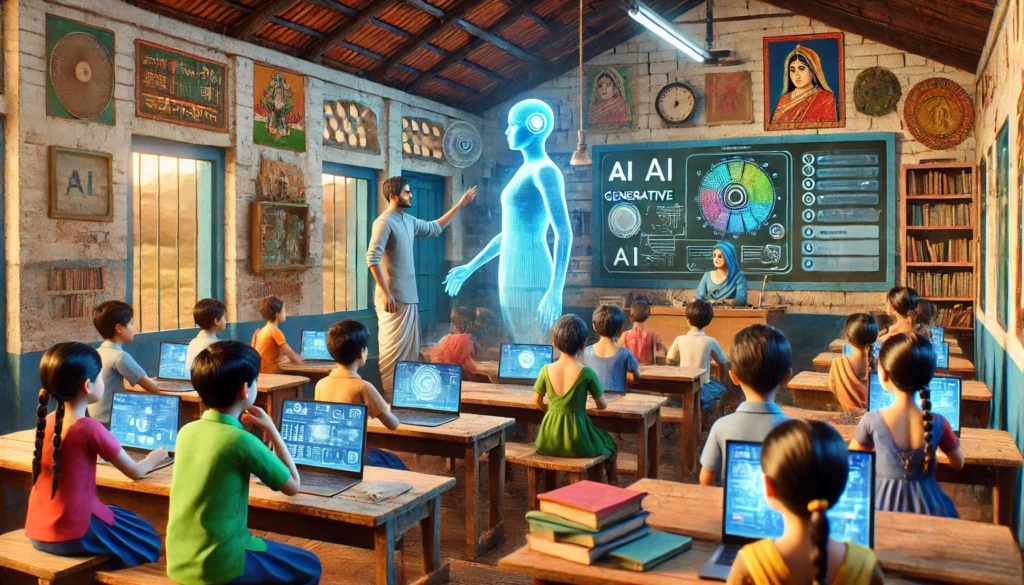A recent study on artificial intelligence (AI) risk perceptions conducted across five countries, including India, has highlighted the distinctive concerns Indian policymakers have regarding AI’s impact on education. While many experts argue these fears are exaggerated, the findings have sparked a broader debate about the risks and benefits of integrating AI into the education sector.
Key Findings of the Study
The study surveyed policymakers and experts in India, the U.S., U.K., Japan, and Taiwan, focusing on AI’s perceived risks and benefits. While most countries ranked education risks lower on their list of concerns, Indian respondents saw it as a significant issue, ranking it above geopolitical risks and technical challenges like alignment problems. This discrepancy underscores India’s unique apprehensions about AI in education.
Concerns revolved around the potential over-reliance on AI tools by students, which could weaken critical thinking and problem-solving skills. For instance, generative AI tools can provide instant solutions to academic problems, potentially discouraging students from engaging in deeper analytical processes. Another challenge is how schools might adapt assessment methods to differentiate between machine-generated and student-driven work.
Experts Disagree: Benefits Outweigh Risks
Despite these concerns, many experts believe the potential benefits of AI in education far outweigh the risks. They argue that AI can revolutionize learning by increasing engagement, enhancing creativity, and providing personalized educational experiences.
AI tools, they contend, can be designed to encourage active learning by guiding students toward solutions rather than providing ready-made answers. This approach could foster critical thinking and problem-solving skills, addressing one of the primary concerns raised by the study.
Furthermore, experts highlight the opportunity to transform education in underprivileged areas. AI can democratize access to high-quality resources, bridging gaps in teacher availability and infrastructure in rural and economically weaker regions.
Potential Risks of AI in Education
Indian educators and policymakers have raised specific concerns about AI in education. Key risks include:
- Loss of Critical Thinking Skills:
Over-reliance on AI-generated answers may hinder students’ ability to think independently or solve problems creatively. - Challenges in Assessment:
The widespread use of AI tools may require a revamp of traditional evaluation methods, as educators might struggle to determine whether work is genuinely student-driven. - Misinformation and Bias:
AI tools trained on flawed or biased data could lead to the dissemination of incorrect or misleading information, impacting students’ learning. - Privacy and Data Security:
Collecting and processing large amounts of student data for AI systems raises concerns about data security and ethical usage.
Opportunities AI Brings to Education
While risks exist, AI also presents transformative opportunities for Indian education:
- Enhanced Engagement:
AI tools can make learning more interactive and appealing, especially for students who struggle with traditional teaching methods. - Personalized Learning:
Adaptive AI systems can cater to individual learning paces and styles, offering customized content to students. - Bridging the Gap in Resources:
AI can address the shortage of qualified teachers in rural and underprivileged areas by providing access to world-class educational content. - Critical Thinking and Creativity:
Well-designed AI tools can challenge students to think critically and creatively by encouraging them to explore concepts in depth. - Alternative to Social Media:
AI-based educational tools can provide a productive way for students to use their devices, offering a better alternative to time spent on social media platforms.
Balancing Innovation and Regulation
To harness AI’s potential while mitigating its risks, thoughtful guardrails are necessary. Policymakers and educators must focus on creating frameworks that promote responsible AI use. Key recommendations include:
- Designing Socratic AI Systems:
AI tools should encourage students to engage in the learning process by guiding them toward answers rather than providing solutions outright. - Improved Assessment Methods:
Education systems must adapt to evaluate students’ understanding and originality effectively, even in the age of AI. - Ethical Use of Data:
Safeguarding student data and ensuring AI tools are free from biases are critical for ethical AI implementation. - Training and Awareness:
Teachers and students must be educated on the effective use of AI tools to build confidence and reduce apprehension about the technology. - Collaborative Development:
Partnerships between government, private organizations, and educational institutions can drive innovation while ensuring alignment with national educational goals.
Future Outlook
Experts believe that as awareness and understanding of AI grow in India, perceptions of its risks will diminish. With appropriate training and infrastructure, educators and students can embrace AI as a tool for improving learning outcomes rather than fearing its impact.
Moreover, the integration of AI into the education system offers an opportunity to rethink and modernize curricula, making them more relevant to today’s technological landscape.
A Boon for India’s Educational Challenges
India faces unique challenges in education, including low engagement levels and disparities in access to quality resources. AI has the potential to address these issues by providing innovative solutions. For instance, interactive AI tools can make learning more engaging for students who currently lack motivation. Similarly, AI-powered platforms can offer personalized support to students in remote areas.
Experts argue that the focus should be on leveraging AI to solve these existing problems rather than fearing hypothetical risks. With the right approach, AI can be a game-changer for Indian education, fostering creativity, critical thinking, and inclusivity.
Conclusion
AI in education is a double-edged sword, presenting both challenges and opportunities. While concerns about its impact on critical thinking and assessment methods are valid, these risks can be mitigated through thoughtful design and implementation. On the other hand, the potential benefits, including enhanced engagement, personalized learning, and improved access to resources, make AI a valuable tool for India’s education sector.
As the country navigates the complexities of integrating AI into education, the focus must remain on creating a balanced approach that maximizes benefits while minimizing risks. By doing so, India can harness the transformative power of AI to shape a brighter future for its students.


